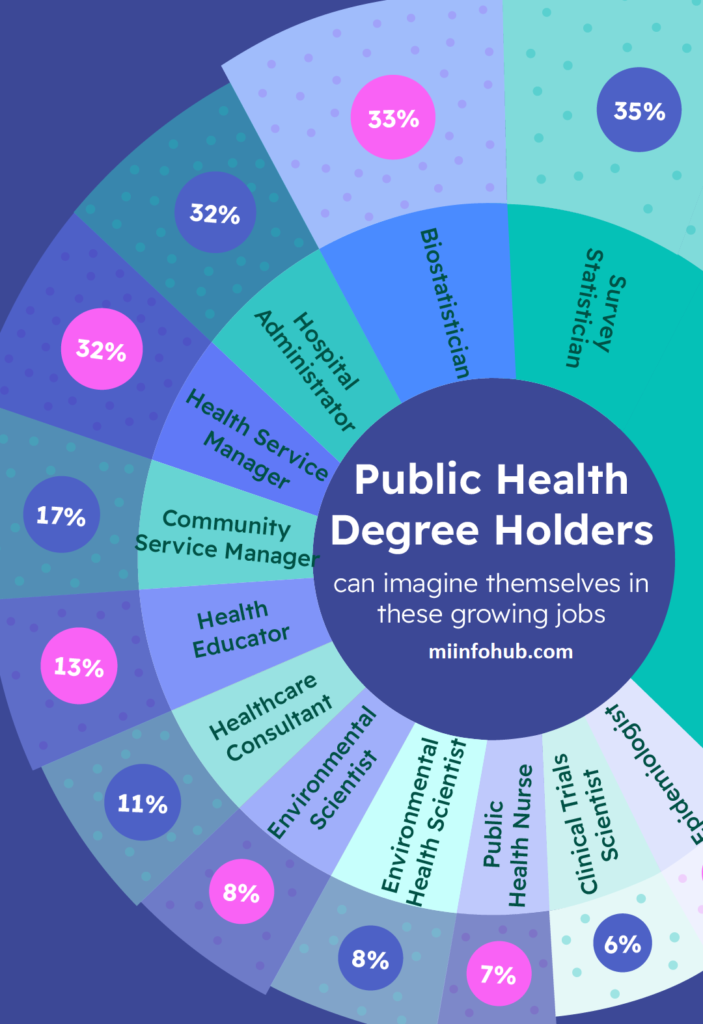A public health degree opens doors to diverse and impactful careers. This field focuses on protecting and improving community health through strategies like research, policy-making, and education. Let’s explore the many career opportunities, essential skills, and tips to make the most of a public health degree.

What Is Public Health?
Public health aims to prevent disease, extend life, and promote health through organized efforts. It addresses health concerns at a community or population level, striving to improve overall societal well-being. If you are intrusted about masters in public health then click here.
Public Health Program Accreditation
Accreditation ensures that public health programs meet quality standards set by recognized accrediting bodies. In the U.S., the Council on Education for Public Health (CEPH) is the primary accrediting organization for public health programs. CEPH accreditation is essential for students who want a reputable education and for programs aiming to uphold industry standards.
Importance Of Accreditation:
- Quality Assurance: Accredited programs follow rigorous curriculum standards, ensuring students receive a high-quality education.
- Eligibility for Certification Exams: Many certifications, such as the Certified in Public Health (CPH) exam, require a degree from an accredited program.
- Greater Employment Opportunities: Employers often prefer candidates from accredited programs, viewing them as well-trained and qualified.
- Financial Aid Access: Accreditation can impact eligibility for federal financial aid, scholarships, and grants.
Types Of Accredited Programs:
- Bachelor’s in Public Health (BPH)
- Master of Public Health (MPH)
- Doctor of Public Health (DrPH)
Selecting An Accredited Program:
When choosing a public health program, check for CEPH accreditation status on the institution’s website or directly on the CEPH website. Attending an accredited program can provide confidence in the value of your education and can enhance your career prospects in public health.
Types Of Public Health Degree And Specializations
Public health degrees vary in level and specialization, each catering to different career paths:
- Associate Degree: Prepares you for entry-level roles, such as a community health worker.
- Bachelor’s Degree: Often leads to roles in health education, health promotion, and program coordination.
- Master’s Degree (MPH): Commonly required for leadership and research roles.
- Doctorate (Ph.D. or DrPH): Focuses on advanced research, teaching, and administration roles.
Specializations include:
- Epidemiology: Study of disease patterns and prevention strategies.
- Global Health: Addresses health issues on a global scale.
- Health Policy: Involves the development of health-related policies.
- Environmental Health: Examines environmental impacts on health, such as air and water quality.

Career Paths With A Public Health Degree
With a public health degree, you can pursue various careers:
- Epidemiologist: Studies disease outbreaks to develop prevention strategies.
- Health Educator: Educates communities about healthy practices and preventive care.
- Environmental Health Specialist: Focuses on environmental factors impacting public health.
- Public Health Analyst: Analyzes health data to inform policies and evaluate programs.
- Healthcare Administrator: Manages health programs and facilities.
- Biostatistician: Uses statistics to study health trends and outcomes.
- Community Health Worker: Connects communities with healthcare resources.
- Health Policy Advisor: Shapes health policies within government or private organizations.
- Infectious Disease Specialist: Researches and manages infectious disease prevention.
Alternative Career Paths With A Public Health Degree
Health Communications Specialist
- Role: Develops public health messaging and campaigns.
- Impact: Raises awareness and influences health behavior.
Public Health Consultant
- Role: Advises organizations on program evaluation and health policy.
- Impact: Improves health outcomes and optimizes programs.
Medical Science Liaison (MSL)
- Role: Connects pharmaceutical companies and healthcare providers.
- Impact: Facilitates collaboration and access to treatment information.
Occupational Health and Safety Specialist
- Role: Analyzes workplace health risks and implements safety policies.
- Impact: Protects employee health and reduces injuries.
Health Policy Analyst
- Role: Analyzes and proposes healthcare policy changes.
- Impact: Shapes public health policy and improves access to care.
Nonprofit Program Manager
- Role: Manages health programs in nonprofit organizations.
- Impact: Addresses health disparities and enhances community services.
Health Economist
- Role: Studies healthcare costs and policies.
- Impact: Promotes efficient resource use and affordability.
Informatics Specialist
- Role: Manages health data systems and analytics.
- Impact: Improves healthcare quality and patient outcomes.
Health Insurance Specialist
- Role: Advises on health insurance policy and claims.
- Impact: Designs consumer-friendly health plans.
Global Health Coordinator
- Role: Organizes health programs in international settings.
- Impact: Enhances healthcare access in underserved regions.
Skills Developed With A Public Health Degree
A public health degree builds vital skills:
- Data Analysis: Interpreting health data is essential for many roles.
- Communication: Effectively conveying complex health information to the public.
- Research Skills: Conducting studies to address health-related issues.
- Problem-Solving: Creating solutions to public health challenges.
- Policy Knowledge: Understanding health regulations to improve community health.

Public Health Ethics
Public health ethics involves the principles and values guiding decisions in public health practice. Unlike clinical ethics, which centers on individual care, public health ethics often focuses on the health of populations and communities. Here’s a breakdown of the core elements in public health ethics:
Balancing Individual Rights And Community Welfare
- Challenge: Public health measures, like vaccination programs or quarantine orders, can sometimes restrict personal freedoms for the greater good.
- Ethical Principle: Public health ethics seeks to balance individual rights with the need to protect community health, emphasizing the least restrictive means to achieve health goals.
Equity And Justice
- Challenge: Health disparities exist within populations due to factors like socioeconomic status, race, and geography.
- Ethical Principle: Fair access to health resources is a core tenet of public health ethics. Policies aim to reduce disparities and ensure all groups receive fair treatment, resources, and opportunities for health improvement.
Transparency And Informed Consent
- Challenge: Public health interventions may involve personal data or medical interventions, raising concerns about autonomy and informed consent.
- Ethical Principle: Transparency in communicating health risks, benefits, and decision-making processes is vital. Public health professionals must provide clear information and, whenever possible, obtain informed consent, respecting individuals’ autonomy.
Accountability And Public Trust
- Challenge: Public health officials and organizations must maintain public trust by being accountable in their decisions, actions, and use of resources.
- Ethical Principle: Building and maintaining trust involves acting with integrity, using resources effectively, and remaining accountable to the community. Ethical public health practices help build long-term confidence in health systems.
Global Responsibilities
- Challenge: Many health issues, like pandemics or climate change, cross borders and affect global populations, necessitating collaboration and a global ethical perspective.
- Ethical Principle: Public health ethics recognizes the need for international cooperation and resource-sharing to address global health challenges, emphasizing a shared responsibility to protect health worldwide.
Protection Of Vulnerable Populations
- Challenge: Vulnerable groups (e.g., elderly, low-income, or marginalized populations) are often at greater risk in health crises.
- Ethical Principle: Public health ethics emphasizes protecting vulnerable populations, ensuring that interventions do not disproportionately burden those with fewer resources or greater health risks.
Job Outlook For Public Health Careers
The demand for public health professionals is growing. Key areas like epidemiology, health education, and environmental health are especially in demand. As communities prioritize wellness, public health expertise is increasingly valued.
Top Employers In Public Health
Public health graduates can find rewarding careers across various sectors. Here are some top employers:
- Government Agencies: Agencies like the CDC, NIH, and local health departments offer roles in epidemiology, health policy, and community outreach.
- Nonprofit Organizations: Organizations like the American Red Cross, WHO, and local charities focus on health education, disease prevention, and policy advocacy.
- Healthcare Providers: Hospitals and health systems employ public health professionals for roles in administration, quality improvement, and infection control.
- Research Institutions: Universities and research centers hire for public health research, data analysis, and academic roles.
- Private Sector: Pharmaceutical companies, insurance firms, and consulting firms value public health experts for roles in data analysis, compliance, and health management.

Salary Expectations And Factors
| Position | Average Salary | Factors Influencing Salary |
|---|---|---|
| Epidemiologist | $70,000 – $110,000 | Experience, education level, and location. |
| Health Educator | $45,000 – $75,000 | Certifications, work setting, and geographic area. |
| Environmental Health Specialist | $55,000 – $90,000 | Experience, specialization, and employer type. |
| Public Health Analyst | $60,000 – $100,000 | Data analysis skills, education, and project complexity. |
| Healthcare Administrator | $75,000 – $130,000 | Size of facility, management experience, and education. |
| Biostatistician | $70,000 – $120,000 | Statistical expertise, advanced degrees, and sector. |
| Community Health Worker | $35,000 – $60,000 | Experience, area served, and funding source. |
| Health Policy Advisor | $70,000 – $120,000 | Policy expertise, location, and employer type. |
| Infectious Disease Specialist | $80,000 – $130,000 | Specialized training, experience, and organization. |
Public Health Trends And Innovations
Public health is constantly evolving. Key trends include:
- Digital Health: Using technology to monitor and promote health.
- Telemedicine: Providing remote healthcare solutions.
- Data Analytics: Leveraging data to make informed health decisions.
Public Health Impact On Society
Public health professionals impact communities by promoting wellness, preventing disease, and reducing healthcare costs. Their work enhances the quality of life and supports healthier communities.

Public Health And Global Health Crises
Public health is crucial during global health crises like pandemics. Professionals work to manage disease spread, improve sanitation, and create emergency response plans, showcasing the importance of a public health degree.
Importance Of Public Health Internships And Volunteering
Practical experience is essential. Internships and volunteer work allow you to apply academic knowledge, build skills, and establish professional connections, which are vital for career growth.
Work-Life Balance In Public Health Careers
Roles in public health vary in intensity. Some positions require long hours, especially during health emergencies, while others offer flexible schedules and remote work opportunities, supporting work-life balance.

Advantages Of A Career In Public Health
A public health career offers many benefits:
- Job Diversity: Opportunities in government, non-profits, academia, and the private sector.
- Impactful Work: Directly contributing to community health and wellness.
- Career Growth: Many fields within public health offer upward mobility.
- Global Opportunities: Public health skills are in demand worldwide.
Common Challenges In Public Health
Public health work can be demanding. Some common challenges include:
- High Emotional Demand: Dealing with serious health issues can be challenging.
- Funding Constraints: Public health roles, particularly in non-profits, may face funding limitations.
- Continuous Learning: Staying updated on research and health trends is essential.
How To Get Started In Public Health
Starting a career in public health involves a few key steps:
- Specialize in an area like epidemiology, health policy, or environmental health.
- Complete Internships with healthcare or public health organizations.
- Network with professionals to explore career options.
- Certifications: Consider certifications like Certified Health Education Specialist (CHES) to boost your credentials.

Further Education And Certifications
Advanced degrees or certifications can enhance career prospects. An MPH or certifications like CHES or Certified Public Health (CPH) are valuable for specialized roles and can improve job competitiveness.
Online Learning And Certification Resources
Online Learning Resources
Coursera
- Offers a variety of public health courses from universities like Johns Hopkins and Stanford.
- Topics include epidemiology, global health, and data analysis.
edX
- Provides online courses from institutions like Harvard and the University of California, Berkeley.
- Features MicroMasters programs in public health and related fields.
FutureLearn
- Hosts courses on public health topics, such as health management and emergency response.
- Partnerships with leading universities and organizations.
Khan Academy
- Offers free resources covering health and medicine topics.
- Includes videos and articles on essential public health concepts.
LinkedIn Learning
- Provides courses on health policy, data analysis, and healthcare management.
- Focuses on skill development for professionals.
Certification Resources
Certified in Public Health (CPH)
- Offered by the National Board of Public Health Examiners (NBPHE).
- Recognizes public health professionals who have met educational and experience requirements.
Certified Health Education Specialist (CHES)
- Provided by the National Commission for Health Education Credentialing, Inc.
- Focuses on health education and promotion skills.
Registered Environmental Health Specialist (REHS)
- Offered by the National Environmental Health Association (NEHA).
- Validates expertise in environmental health practices.
Certified in Healthcare Compliance (CHC)
- Provided by the Compliance Certification Board (CCB).
- Focuses on compliance within healthcare organizations.
Master of Public Health (MPH) Programs
- Many universities offer online MPH degrees.
- Programs often include specializations in epidemiology, health policy, or global health.
Advantages Of Online Learning And Certification
- Flexibility: Study at your own pace and schedule.
- Accessibility: Learn from anywhere with an internet connection.
- Diverse Options: Wide range of topics and specializations available.
- Networking Opportunities: Engage with peers and professionals through online forums and discussion groups.
- Career Advancement: Certifications can enhance job prospects and demonstrate expertise in specific areas.

Tips To Succeed With A Public Health Degree
To maximize your potential in public health:
- Stay Informed: Keep up with public health news and developments.
- Gain Experience: Seek volunteer or internship opportunities.
- Enhance Skills: Take courses in data analysis, policy, or communication.
- Build a Network: Attend conferences and join public health organizations.
Conclusion
A public health degree offers a path to diverse, impactful careers. From educating communities to analyzing health data, public health professionals make a significant difference. With the right skills, dedication, and further certifications, you can build a rewarding career that promotes better health for all.

